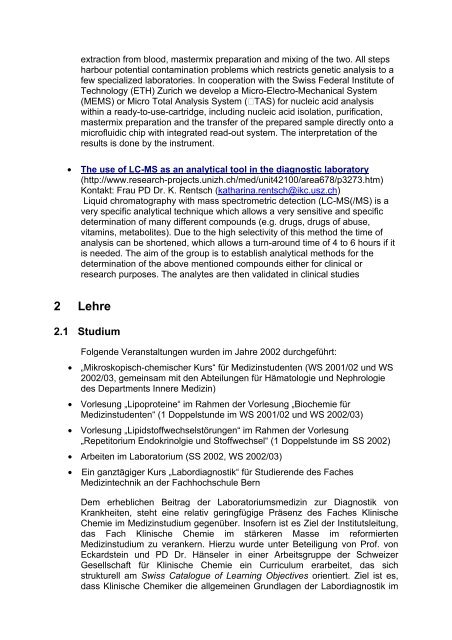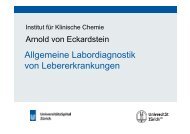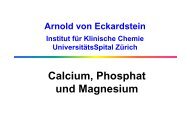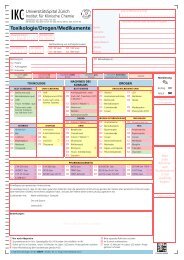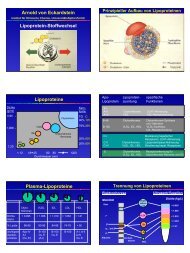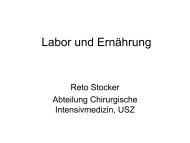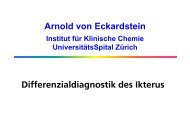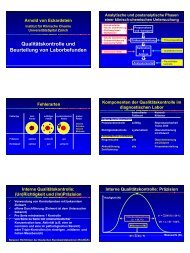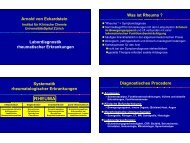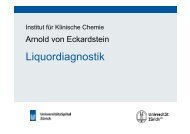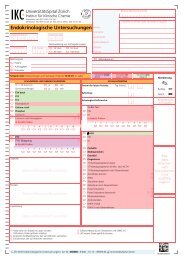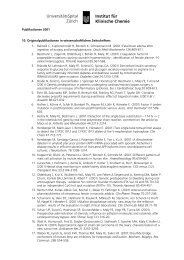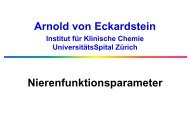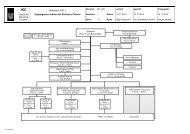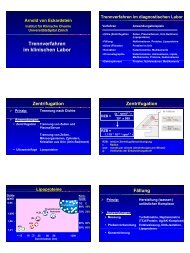Akademischer Bericht 2002 - Institut für Klinische Chemie ...
Akademischer Bericht 2002 - Institut für Klinische Chemie ...
Akademischer Bericht 2002 - Institut für Klinische Chemie ...
Erfolgreiche ePaper selbst erstellen
Machen Sie aus Ihren PDF Publikationen ein blätterbares Flipbook mit unserer einzigartigen Google optimierten e-Paper Software.
extraction from blood, mastermix preparation and mixing of the two. All stepsharbour potential contamination problems which restricts genetic analysis to afew specialized laboratories. In cooperation with the Swiss Federal <strong>Institut</strong>e ofTechnology (ETH) Zurich we develop a Micro-Electro-Mechanical System(MEMS) or Micro Total Analysis System (TAS) for nucleic acid analysiswithin a ready-to-use-cartridge, including nucleic acid isolation, purification,mastermix preparation and the transfer of the prepared sample directly onto amicrofluidic chip with integrated read-out system. The interpretation of theresults is done by the instrument.• The use of LC-MS as an analytical tool in the diagnostic laboratory(http://www.research-projects.unizh.ch/med/unit42100/area678/p3273.htm)Kontakt: Frau PD Dr. K. Rentsch (katharina.rentsch@ikc.usz.ch)Liquid chromatography with mass spectrometric detection (LC-MS(/MS) is avery specific analytical technique which allows a very sensitive and specificdetermination of many different compounds (e.g. drugs, drugs of abuse,vitamins, metabolites). Due to the high selectivity of this method the time ofanalysis can be shortened, which allows a turn-around time of 4 to 6 hours if itis needed. The aim of the group is to establish analytical methods for thedetermination of the above mentioned compounds either for clinical orresearch purposes. The analytes are then validated in clinical studies2 Lehre2.1 StudiumFolgende Veranstaltungen wurden im Jahre <strong>2002</strong> durchgeführt:• „Mikroskopisch-chemischer Kurs“ <strong>für</strong> Medizinstudenten (WS 2001/02 und WS<strong>2002</strong>/03, gemeinsam mit den Abteilungen <strong>für</strong> Hämatologie und Nephrologiedes Departments Innere Medizin)• Vorlesung „Lipoproteine“ im Rahmen der Vorlesung „Biochemie <strong>für</strong>Medizinstudenten“ (1 Doppelstunde im WS 2001/02 und WS <strong>2002</strong>/03)• Vorlesung „Lipidstoffwechselstörungen“ im Rahmen der Vorlesung„Repetitorium Endokrinolgie und Stoffwechsel“ (1 Doppelstunde im SS <strong>2002</strong>)• Arbeiten im Laboratorium (SS <strong>2002</strong>, WS <strong>2002</strong>/03)• Ein ganztägiger Kurs „Labordiagnostik“ <strong>für</strong> Studierende des FachesMedizintechnik an der Fachhochschule BernDem erheblichen Beitrag der Laboratoriumsmedizin zur Diagnostik vonKrankheiten, steht eine relativ geringfügige Präsenz des Faches <strong>Klinische</strong><strong>Chemie</strong> im Medizinstudium gegenüber. Insofern ist es Ziel der <strong>Institut</strong>sleitung,das Fach <strong>Klinische</strong> <strong>Chemie</strong> im stärkeren Masse im reformiertenMedizinstudium zu verankern. Hierzu wurde unter Beteiligung von Prof. vonEckardstein und PD Dr. Hänseler in einer Arbeitsgruppe der SchweizerGesellschaft <strong>für</strong> <strong>Klinische</strong> <strong>Chemie</strong> ein Curriculum erarbeitet, das sichstrukturell am Swiss Catalogue of Learning Objectives orientiert. Ziel ist es,dass <strong>Klinische</strong> Chemiker die allgemeinen Grundlagen der Labordiagnostik im


